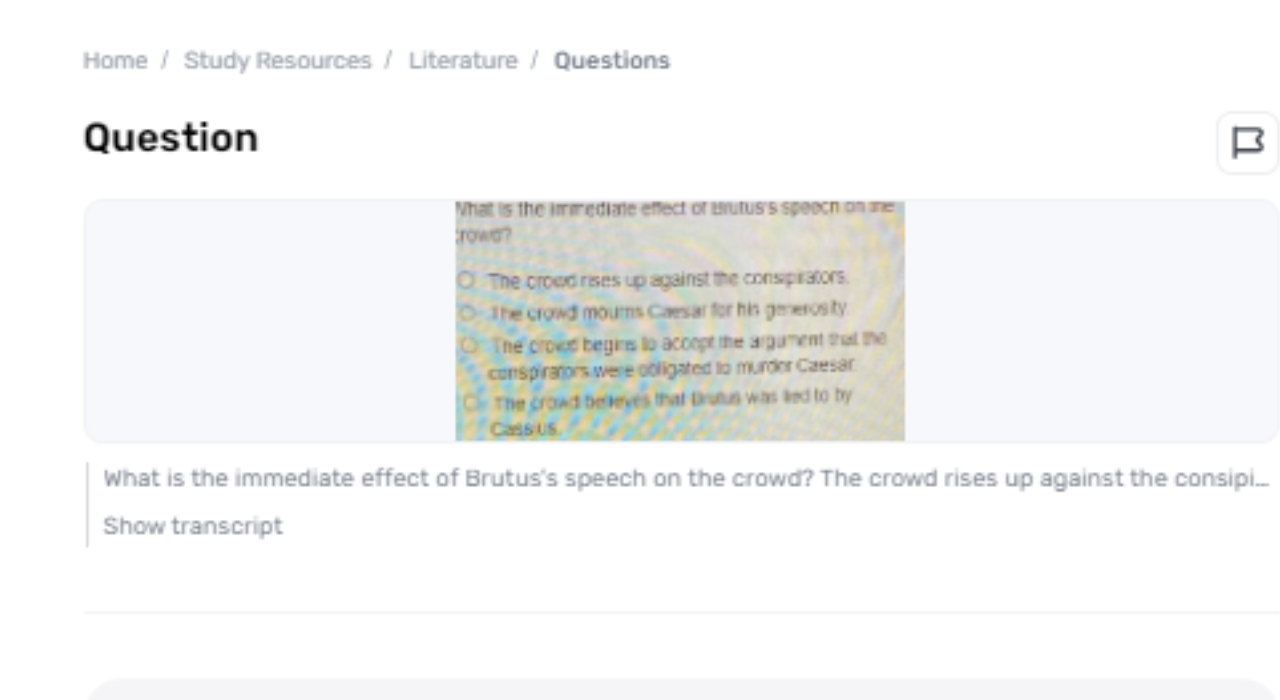In Shakespeare's Julius Caesar, the control of talk and speech plays a pivotal part in forming open conclusions and affecting political results. One of the foremost urgent minutes within the play happens when Brutus conveys his discourse to the swarm following the assassination of Julius Caesar. This discourse may be a key minute within the account because it gives an understanding of Brutus's inspirations and the prompt response of the Roman populace. Understanding the quick impact of Brutus's discourse on the swarm is fundamental for getting a handle on the elements of influence and open opinion within the play. This exposition investigates what is the immediate effect of brutus's speech on the crowd? the crowd's introductory reaction, and the ensuing results.
Brutus's Explanatory Procedure
Brutus’s discourse is deliberately made to request the crowd’s sense of honor and reason. He starts by tending to the individuals as "Romans, kinsmen, and darlings of freedom," which sets up a sense of commonality and shared values. Brutus emphasizes his claim respectable eagerly and defense of Caesar's death, depicting it as a vital act to anticipate Caesar's ambition to wreck the Republic. He contends that Caesar's desire posed a risk to Rome's flexibility and majority rule government, showing himself as a protector of the republic instead of a killer. This consistent and moral offer points to adjust the swarm with Brutus's viewpoint by surrounding the death as a give-up for the more prominent great.
Introductory Response to the Swarm
The quick impact of Brutus's discourse on the swarm is one of assertion and endorsement. The swarm reacts emphatically to Brutus’s levelheaded and principled contention, which adjusts to their want for solidness and equity. They are induced by Brutus’s depiction of Caesar’s aspiration as a danger to their freedom and by his depiction of death as an act of patriotism. The crowd's beginning response reflects their belief in Brutus's judgment and his notoriety as a regarded pioneer. This positive reaction is proven by their commendation and steady exclamations, indicating that Brutus has effectively won them over to his side.
The Affect of Brutus’s Enthusiastic Offer
Despite the starting positive reaction, the effect of Brutus’s enthusiastic request isn't enduring. Brutus's discourse requests reason and honor, but it needs a solid passionate association that might maintain the crowd's bolster within the long term. Whereas Brutus viably legitimizes the death, he does not completely address the passionate connection that the swarm may have had to Caesar. This hole in his request clears out room for a counter-narrative, as illustrated when Stamp Antony conveys his possessive discourse. The viability of Brutus’s levelheaded approach is in this way undermined by the crowd’s enthusiastic reaction to Antony’s speech, which reawakens their love for Caesar.
Differentiate with Antony’s Discourse
The differentiation between Brutus’s and Antony’s addresses highlights the restrictions of Brutus’s explanatory approach. Whereas Brutus depends on consistent contentions and offers the crowd’s sense of obligation, Antony utilizes passionate talk and distinctive symbolism to blend the crowd’s feelings. Antony's discourse contrasts with Brutus by centering on Caesar's ethics, the individual misfortune felt by his companions, and the bad form of death. Antony’s vital utilization of rhetorical questions, emotional delays, and evocative dialect turns the crowd’s assumption against the schemers, outlining the control of passionate offers over sound contention in influencing public opinion.
Rules for Responding to a Gauth Address
1. Clarify the Address:
Decide in case the request is around establishment, utilization, upkeep, or problem-solving to coordinate your reaction viably.
2. Collect Data:
Allude to Gauth’s official back materials and consider common client scenarios to guarantee a point-by-point and exact reply.
3. Formulate the Reaction:
Structure your answer in a coherent stream, giving clear, noteworthy steps or arrangements important to the inquiry.
4. Review and Refine:
Affirm the information's exactness and alter your reaction for clarity, guaranteeing it is direct and effortlessly reasonable.

Conclusion
In conclusion, Brutus’s discourse encompasses a critical prompt impact on the swarm, driving to their starting endorsement and bolstering the death of Julius Caesar. His sound and honorable approach effectively adjusts to the crowd’s craving for equity and soundness, illustrating the control of contemplated contention in forming an open conclusion. In any case, the enduring impact of Brutus discourse is undermined by Antony's enthusiastic and influential talk, which shifts the crowd devotion and encourages turmoil. This energy outlines the complexity of explanatory impact and the significance of both consistent and passionate offers in convincing a group of onlookers. Understanding the quick impact of Brutus discourse gives profitable knowledge into the components of influence and the moving nature of open opinion in Shakespeare's play.


